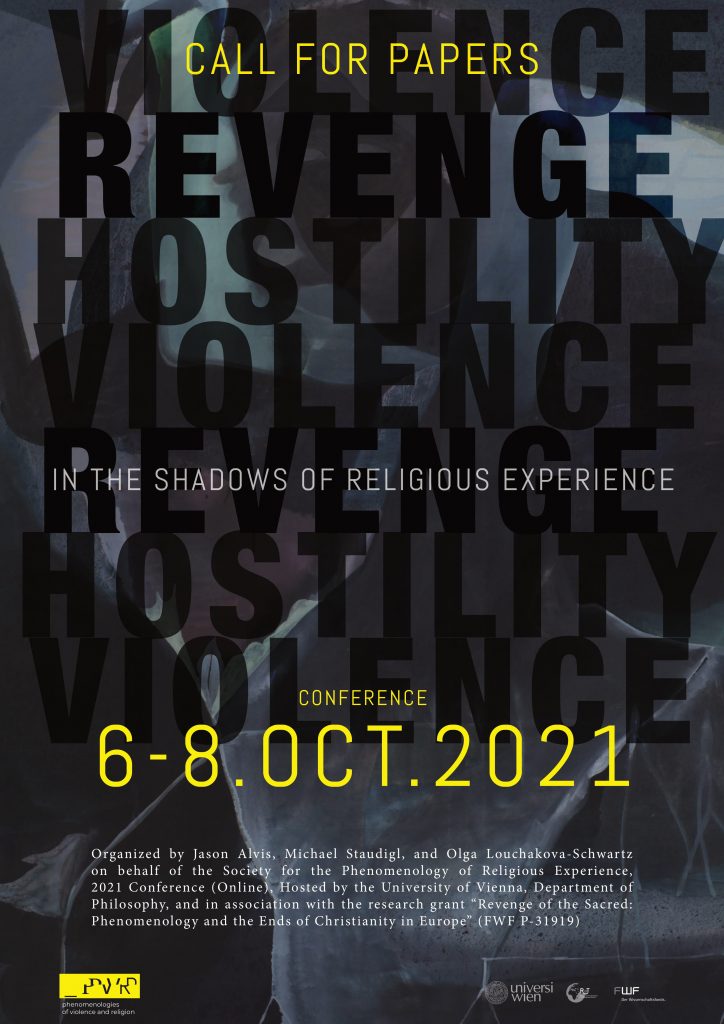Oct 6-8, 2021
CFP – Society for the Phenomenology of Religious Experience, 2021 Conference (Online), Hosted by the University of Vienna, Department of Philosophy, and in association with the research grant “Revenge of the Sacred: Phenomenology and the Ends of Christianity in Europe” (FWF P-31919)
Recent advances in the study of religion successfully have demonstrated the positive, community-building potentials of religious experience in terms of its material/performative practices, psychological models of coping with pain/crisis, and embodied habits that help individuals establish more co-creative forms of reason in order to develop more grounded social imaginaries and epistemologies.
Without disregarding or disagreeing with the innumerable potential effects and benefits of having and creating religious experiences, in this conference we wish to focus more so on how the irrevocable ambivalence of religious experience simultaneously can lead it to bear its discontents and negative socialities, namely, in the forms of hostility, violence, and revenge. Although violence is not the necessary product of hostility, it always looms as a threat and is often motivated by various processes of enmification. And although revenge is not a necessary response to some preceding act of violence, individuals and groups quite often resort to it in order to appease aggrieved individuals and parties. Of course, this trifecta of hostility, violence, and revenge very often is invoked in political activities irrespective of religious traditions and engagements. Yet in all too many cases, this trifecta becomes even more pronounced due to the ways and means individuals and groups have, and choose to have, religious experiences and use religious narratives to justify violent responses.
Can we describe phenomenologically the core motivations for why hostility, violence, or revenge too frequently are preferred over peaceful interactions and phronetic engagements with others? Does a certain entitlement or perverse freedom arise from a sense of representing divine power, stemming from unconditional claims that are promoted “in the name of” a transcendent principle? To what degree does the dialectic between purity and compromise play a role in the will to act violently towards others who one deems to embody a “threat of disorder,” a stain of impurity, or are simply passed by indifferently? Could the clear-cut orders of “the sacred” and “the secular” possibly contribute to deepening an age-old dualism or desire for equilibrium through revenge? Further, if religious experience does not necessarily invite the irrational (or on the contrary, hyper-rational) responses of seeking the harm, injury, or “correction” of others, in what way do forms of religious experience contribute to the (re)production of negative socialities that revolve around imaginations of threat and disorder? What kind of responsibilities might the presence of a non or a-religious community or politic play in creating spaces of opposition and conflict?
In order to find constructive answers to such questions, we invite reference to the whole phenomenological movement, including post-phenomenology, hermeneutics, and deconstruction; historical and contemporary research with the engagement of phenomenology, theological phenomenology, experienced-based comparative studies like cultural anthropology of experience, qualitatively based sociology of religion, as well as theological and psychological perspectives that utilize phenomenological research methods. Abstract and Paper proposals on the following topics would be most welcome:
– Critiques of the relationship between “religion” and “secularism” as a social, political, and epistemological separation that is prone to deepen habits of hostility, legitimize violence, and motivate revenge;
– Analyses of the role religious experience (and the discourse about it) might play in academic, social, and political discourse(s) on hostility, violence, or revenge;
– Developments of accounts of religious experience that clearly demonstrate its inherently ambiguous role in how it fundamentally is constitutive of the “human condition”;
– Depictions of the theologico-political undercurrents of late modern social imaginaries that nourish the habitus of “cultures of violence”;
– Descriptions of how the break-down of meaning in a) the maelstrom of globalization, b) the advent of apathy and indifference in a modernity spinning out of control, and c) the social construction of murderous consent to neoliberal exploitation and the resulting nihilism of a commodified society committed to the myth of progress all have influenced religious communities and their contemporary self-understanding.
Please submit papers of no more than 600 words, formatted for anonymous review, before JULY 30, 2021. Enclose your biographic information in the body of email. Email for the submission is vienna2021@sophere.org You should receive an acknowledgment of your submission. Provisional notifications of acceptance will be emailed by AUGUST 15, 2021. Authors whose submissions are provisionally accepted must become members of SoPheRE before acceptance is confirmed https://sophere.org/membership/
The format of presentation: 30 minutes including question and answer period, i.e. a paper of approximately 3500 words.
Selected papers will be published in a special issue of Religions and through other venues.
Contact:
Jason Alvis jason.wesley.alvis@univie.ac.at
Michael Staudigl michael.staudigl@univie.ac.at
Please feel free to distribute.
Registration fees are $28 (Professional membership plus processing fee).
Please register here.
Upon registration, you will receive the zoom link for the conference.



